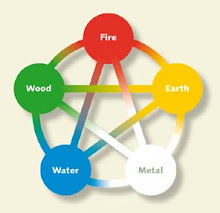You may have noticed that many people offer acupuncture as part of their health care service. Often the letters after their name are not standard, that is, different people claim different qualifications. What do all those letters mean? And how does their practice differ from each other?
Acupuncture is generally viewed as the act of putting needles into certain parts of the body to achieve relief from symptoms, the most commonly accepted symptom being pain. But, acupuncture, in that sense, is only a very small part of the overall system of Chinese medicine. A very important part, yes, but to know where and when to put needles requires a diagnosis. Because Chinese medicine has a whole different viewpoint from Western or 'allopathic' medicine, the way a diagnosis is made differs, too. Just as in allopathic medicine a series of observations, history taking and examinations are made but, being different systems, these are not carried out the same way, nor are they looking at the same things. Trying to superimpose one on the other often means that neither system is as effective as just using the one to it's purest extent. That is not to say the systems are not able to work together as, in the right hands, this is often an ideal combination. But the right hands make for the right results.
For example, if you had a broken leg and consulted an Ear, Nose and Throat surgeon, he/she might have a vague idea of what to do and carry out some basic treatments and your leg might set quite well. But, clearly, their expertise and competence in managing a broken leg would be nothing like as good as an orthopaedic surgeon, who would know all the possible ways to make sure your leg really did heal, that you had no ill effects from it and that any untoward incidents were managed properly. This would be especially true if it was a complicated fracture. Similarly, if you want acupuncture, going to someone with a short, basic training might be all you need but, they do not have the ability to diagnose using full Chinese medical principles. For short term, minor problems (such as a sprain or strain) this is not something to concern patients. But, for long-term or complicated problems, an acupuncturist who is fully trained is going to have a much better chance of sorting it out.
So, how to know who is fully trained? The first thing to do is ask! A fully qualified acupuncturist has the letters LicAc after their name, that is, Licenced Acupuncturist. Many are also members of the British Acupuncture Council (BAcC) but not all members are fully qualified and not all fully qualified practitioners are in the BAcC, so - ask!
GPs are often members of the British Medical Acupuncture Society (BMAS), an organisation that is specifically for allopathic practitioners like doctors, nurses, midwives etc. The basic training is 24 hours over two weekends.
Physiotherapists usually have AACP (Acupuncture Association of Chartered Physiotherapists) after their name. This course has 80 hours training.
Other practitioners such as podiatrists, sports therapists and osteopaths may be in APO (Acupuncture Practitioners Organisation) which requires 80 hours training for full membership and 200 hours over 2 years for advanced membership.
LicAc requires a minimum of 3000 hours training, usually full time over three years - many LicAc programmes are aligned to Degree programmes at recognised universities.
There may be other qualifications but, these are the main ones you will see. So, choosing an acupuncturist very much depends on what it is you want them to do. Mostly, someone who does not hold a LicAc cannot call themselves 'an acupuncturist', although they are allowed to say they Do Acupuncture, that is, putting needles in points on the body. How they decide which points to use and when is not based on the diagnostic principles of Chinese medicine, so the acupuncture given is not based on the huge amount of information and knowledge belonging to that system. Generally, the short-course training is based on the acupuncture equivalent of first aid. If first aid is what you need, then those practitioners are excellent. If treatment of a problem is what you need, then a full diagnosis is the only way to get acupuncture that is more likely to be effective.
Next post, we shall look in more depth at what the difference is between the two systems of health care.
Thursday, 15 April 2010
Subscribe to:
Post Comments (Atom)


No comments:
Post a Comment